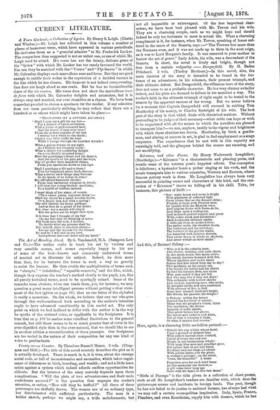County versus Counter. By Theodore Russell Monro. 3 vols. (Chap-
man and Hall.)—The title of this novel scarcely describes the plot as it is actually developed. There is much in it, it is true, about the strange social code, so full of inconsistencies and anomalies, which takes cogni- sance of differences in birth, breeding, and wealth ; and not a little keen satire against a system which indeed affords endless opportunities for ridicule. But the interest of the story scarcely depends upon these complications. "Will the plots of two adventuresses and their male confederate succeed ?" is the question that engages the reader's attention, or rather, "How will they be baffled ?" All three of these personages are skilfully drawn. The women RTC Of an ordinary type, but discriminated with sufficient particularity. The man is a bolder sketch, perhaps we might say, a trifle melodramatic, but
not all impossible or extravagant. Of the less important char- acters, we have been best pleased with Mr. Trevor and his wife. They are a charming couple, such as we might hope and should indeed be only too fortunate to meet in actual life. What a charming compliment is it, for instance, when Mr. Trevor, speaking of losses suf- fered in the cause of the Stuarts, says ;—" The Trevors lost more than the Normans even, and it was not made up to them in the next reign, as it was to Lord Margate's family. It was reserved to your mother to bestow the act of grace." Lady Adele, his wife, was a descendant of the Stuarts. In short, the novel is lively and bright, though not free from a certain vulgarity. — Dangerfield. By H. Baden Pritchard. 3 vols. (Tinsley Brothers.)---In this novel, also, the main interest of the story is intended to be found in the for- tunes of an adventurer, in his schemes, their present triumph, and their ultimate defeat. But Dangerfleld, the villanons hero of the story, does not seem to us a probable character. He is a very clumsy swindler indeed, and his plots are doomed to failure in too manifest a way. The reader's faith in the ultimate triumph of right ought to be tested to the utmost by the apparent success of the wrong. But we never believe for a moment that Captain Danger-field will succeed in robbing Tom Heathorley of his money, or Charles Seebright of his wife. The beat part of the story is that which deals with theatrical matters. Without pretending to be judges of their accuracy—what critic can hope or wish to be acquainted with all the scenes to which the novelists are pleased to transport him ?—we can, anyhow, testify to the vigour and brightness with which these sketches are drawn. Heatherley, by birth a gentle- man, and aiming at success in art, is glad to find employment as a stage carpenter. The experiences that he met with in this capacity are amusingly told, and the glimpses behind the scenes are amusing, and not unedifying.






























 Previous page
Previous page